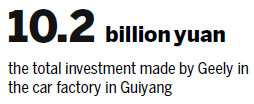
Zhejiang Geely Holding Group Co began construction of its new-energy car manufacturing base in Guiyang, the capital city of Guizhou province, on Tuesday.
The factory is the first passenger car manufacturing base in Guizhou province. Geely is aiming to make its first methanol-powered car in 2017.
The 0.6-square-kilometer factory will consist of a modernized production line of punching press, welding, painting and assembly, and will make finished methanol-powered automobiles. The total investment is around 10.2 billion yuan ($1.6 billion).
When completed, the base will be able to generate annual output value of 27 billion yuan and pay 4.37 billion yuan in tax every year.
It is also expected to create 17.6 billion yuan in output value in the upper stream of the production line and 71 billion yuan worth of auto parts.
"Guiyang has rich methanol resources," said Li Shufu, chairman of Geely.
"Guizhou is a pioneer in methanol development," said Liu Wenxin, deputy Party chief of Guiyang. "Geely's manufacturing base is a key project in Guizhou's equipment manufacturing industry. The project will boost Guiyang's high-end and environmentally friendly manufacturing and independent research and development capacity."
Guizhou is one of the four provinces that have been designated as methanol car pilot program bases by the central government.

Geely has devoted itself to new-energy vehicle development, and it is the first automaker in China that has engaged in M100 methanol research and development and industrialized the process.
Geely announced its "Blue Geely" plan on November 18 with a view to turn 90 percent, or 1 million units, of its total production into new-energy cars, and take the lead in new-energy technology, intelligence, and ultra lightweight technology by 2020.
It is keen to lower petrol consumption to less than 1.5 liters per 100 kilometers.
Geely unveiled its first electric car during the Guangzhou Auto Show earlier this month. It was priced in the range of 228,800 yuan to 249,800 yuan.
China started research and development of methanol cars in the 1980s, said Jia Tingting, auto industry analyst with chem99.com. Till now, apart from the pilot program provinces, another 22 provinces have methanol-powered cars, which consume energy worth 0.4 yuan per kilometer, compared with 0.7 yuan per kilometer for gasoline-powered cars, he said.
In the past few years, since the methanol car pilot program started, only a few hundred units have been rolled out. The lack of standards and subsidiary policies are the main obstacles for methanol cars, he said.
National policies and availability of various links on the production line are going to be key to Geely's new-energy car ambitions, Jia said.
Zeng Jun contributed to this story.
Contact the writer at [email protected] and [email protected]